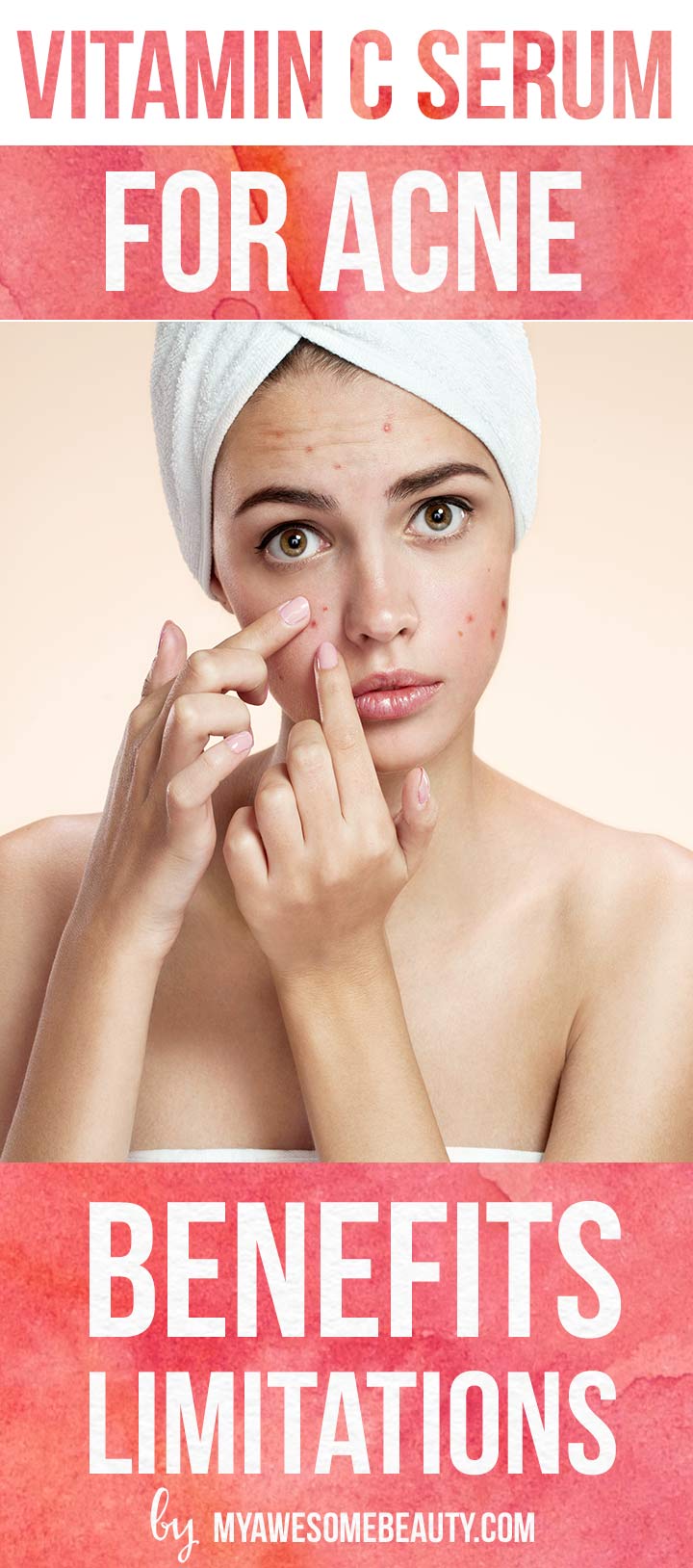
Vitamin C Serums are without a doubt one of the most effective serums available and on top of that, you’ll find that they are a popular cosmetic purchase too. In fact, studies have shown that they are one of the most-bought cosmetics on the market.
The fact is, vitamin C comes with a lot of skin benefits and is a unique ingredient in its own. We all know what a fantastic antiaging solution it is, but it can also be incredibly useful for acne prone skin as it has shown significant results in reducing the risk of acne outbreaks from spreading, reducing redness and helping to fade hyperpigmentation, acne scars and acne marks.
Our current best vitamin C serum for acne scars
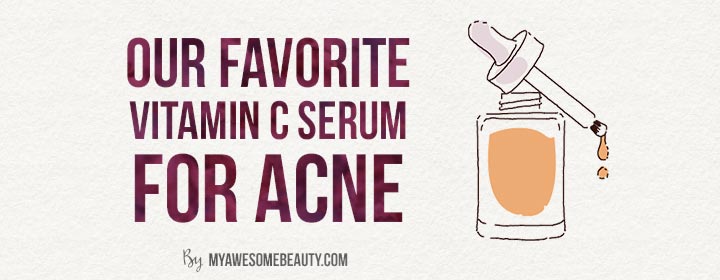
If you are a reader of myawesomebeauty.com, you know we refuse to pay a fortune to get effective products…. We don’t want to pay for all the marketing and endorsement or for the fancy packaging. We want effective products that deliver results. So, don’t bother to buy those $100 vitamin C serums; you can find products which are as good or even better for a fraction of the price.
For example, here is our current best vitamin C serum for acne prone skin, that we tested. We love the percentage of actives
- 20% of Vitamin C
- 3,5% Niacinamide
- 2,5% Retinol
- 5% hyaluronic acid
- 2% Salicylic acid
Yeah, we love this one here on Amazon as this serum has everything you should expect if you have acne. Keep in mind that vitamin C alone is not enough… You need specific actives for acne. That is the case with this serum here. 2 members of our review team got awesome results with it. They were not a big fan of the smell though but it was bearable.
credit: Amazon
We will update this with another serum if we find a better one.
The second serum here (on Amazon) is an example of what acne prone skins should avoid: this is a serum with only vitamin C (15%) without other actives that could help with your acne. The other thing that bothers us is the presence of alcohol which will dry out your skin and makes your oily or combination skin worse in the long run with an increase in bumps and larger pores. And on top of that it is way too expensive. (about $80 )
Reasons to Using a Vitamin C Serum for Acne
Ok, let’s focus on how Vitamin C Serums can be beneficial to anyone who suffers from Acne.
Reason 1 : Vitamin C Helps to Prevent Pimples and Acne from Occurring
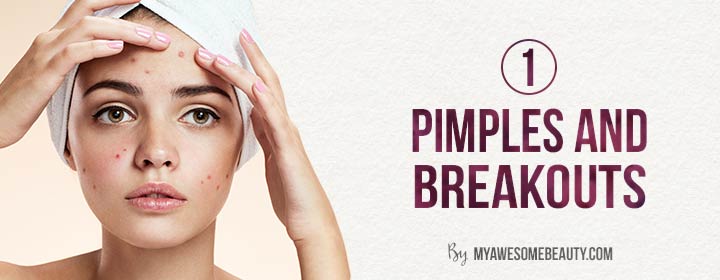
According to a study that was recently published by “The Journal of Clinical and Aesthetic Dermatology”, acne can be caused by something else which has only just been discovered. This new cause is “Free Radicals” – a type of molecule that you probably already know, which can produced as a result of either air pollution or sunlight.
In the past, free radicals have been known to be the cause of dark skin pigment, destroying collagen, and even causing damage to our DNA and as of recently, it’s known to cause acne.
How can “Free Radicals” be the cause of acne?
Well, these molecules cause an increase in skin inflammation which as a result, blocks your skin’s pores. This inflammation traps any dirt, dead skin, or harmful bacteria inside of your pores, which then causes an acne (or a pimple) outbreak to occur.If free radicals can wreak havoc to our skin, then it won’t be a surprise if I tell you that antioxydants may help with your acne pimples.
The reason is simple : antioxidants neutralise any Free Radicals molecules as well as repairing any damaged skin cells.
And guess which molecule is one of the most potent antioxydants on earth? Yep, Vitamin C.
Yeah Vitamin C is one of the most recommended antioxidants because there are many studies showing that applying it topically to your skin can protect it from uv damage and pollution, by neutralizing free radicals and reducing the formation of new free radicals, which as a result, means less pimples and breakouts in the long run.
Reason 2 : Vitamin C Reduces Irritation, Inflammation, and Protect Your Capillaries
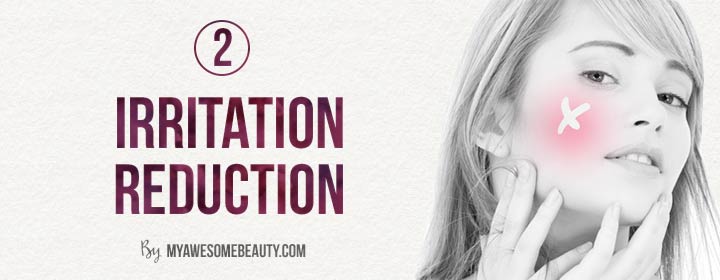
When your skin is damaged, it begins to inflame or become irritated and because of that, further damage is caused by us scratching and touching this irritation (sometimes we can’t help it – there’s a reason it’s called “irritation”). This can make the inflammed area become incredibly painful and look a lot worse than it is.
In order to help reduce and manage any irritation and inflammation which you experience, you could use Vitamin C.
Studies have indeed shown that when used appropriately, and if it is a high concentration, Vitamin C can help to reduce inflammation.
Indeed, vitamin C has anti-inflammatory properties that can be beneficial to even advanced inflammation such as rosacea and acne scars.
There are also other studies which further show that Vitamin C can be beneficial to your skin. Not only can it be used to strengthen your blood vessels, but it can also improve the damage done to red skin prone to broken capillaries and substantially improve their appearance.
Reason 3 : If Acne Hyperpigmentation Strikes, Vitamin C can Lighten the Pigmentation
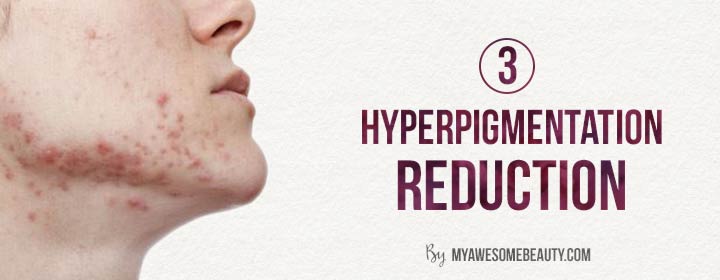
Vitamin C can help to prevent your body from producing more skin pigment melanin than it should be. When used, Vitamin C will prevent the melanin from being produced which will help to improve the natural pigmentation of your skin.
It’s also worth noting that this impacts all existing dark spots on your skin, as well as preventing any future dark spots from breaking out. All in all, by continuously using Vitamin C you’ll be able to significantly reduce hyperpigmentation and prevent it from occurring in the future.
From this benefit alone, there’s no doubting that a Vitamin C Serum could really improve your skin. Better skin complexion, brightened skin, what’s not to love?
The thing is, in order to achieve these things, you must be using a Vitamin C Serum on a consistent basis. Our suggestion would be to use a serum once in the morning, and once in the evening to see the best results possible.
Reason 4 : Fade Away Those Acne Scars
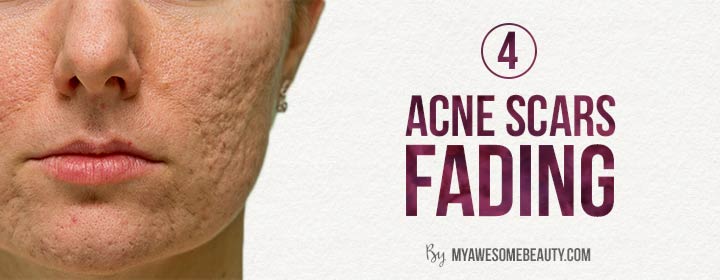
This is something which bothers most people who experience acne – the horrible acne scars which are left behind which make them self-conscious. Fortunately, this is one of the biggest benefits to using a Vitamin C Serum.
The most commonly produced protein in our bodies is collagen – a massive 70% of the protein that is found in your skin cells is collagen! This protein is produced by your body and is designed to keep your skin looking plump and young.
Over the past decade or so there have been many studies conducted which have all shown that Vitamin C can significantly increase the production of collagen in not only young people’s skin but older people’s too. Regardless of what age you are, it’s never too late to check out a Vitamin C Serum for acne scars or hyperpigmentation.
What makes the production of collagen impact my acne?
The reason for this is that Vitamin C will boost the production of collagen and as a result, will help fill in the holes from acne scars and help repair your skin.
Can a Vitamin C Serum Alone Help to Heal Acne?
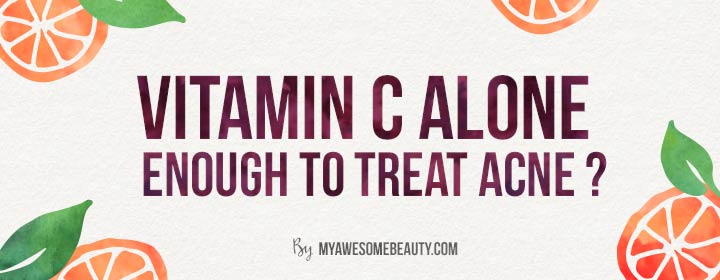
The short answer to this is no. If you’re trying to treat your acne and you’re looking to reap the benefits that come with using a Vitamin C Serum then you have to put in a lot more than only vitamin C. Yep, using Vitamin C will only do so much.
Vitamin C will only deal with one player in the acne game, there are so many other players or factors that you need to take into account. That is why if you are looking for a good vitamin C serum for acne prone skin, then you will have to make sure it has some additional ingredients in it as well that will target the other acne causes. This is what we will cover in the next paragraph.
Which other Ingredients You Should Look Out for in Vitamin C Serums
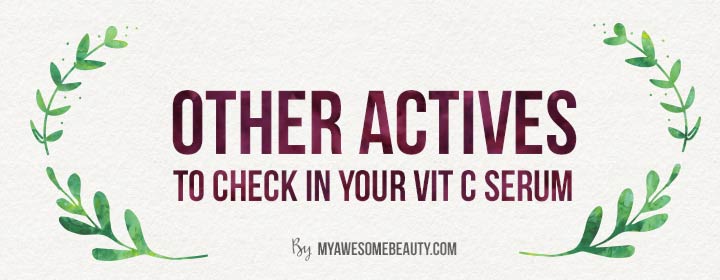
There are other ingredients which on top of Vitamin C, you should be looking out for in a Vitamin C Serum, such as :
Salicylic Acid (Beta hydroxy acid)
It is one of my favorite cosmetic ingredient (that is often prefered to benzoyl peroxyde in many acne treatments because it is less drying and irritating)
An added benefit to using a product that contains salicylic acid is that it can also help prevent blackheads (or whiteheads). It’s not difficult to find this product as it’s a key ingredient in most skin care products. The usual strength is 0.5% to 3%.
Retinol ( Vitamin A derivative)
This vitamin A derivative is another interesting cosmetic ingredient for acne.
What does this ingredient bring to the table?
Retinol is very effective at speeding up skin cell turnover, and resurfacing the skin.
Of course, as always, if you want to get noticeable results, you will have to use the product consistently. That is the price to pay to improve your skin texture and skin tone as a whole.
Note that retinol may (this only occurs for some people) increase how sensitive your skin is to sunlight (or UV rays in general) so of course, make sure that you use plenty of sunsceen on sunny days. That is why, retinol products are mostly used atr night before heading to bed so that there is plenty of time for it to be absorbed and less damage will be inflicted by sunlight.
Niacinamide (otherwise known as Vitamin B3)
This is one of the most recent ingredients which have been discovered to be very effective in dealing with acne. There have been several studies produced which show the effectiveness of Vitamin B3 and how it can be used for healing acne damage. As a matter of fact, most of these studies have also called out prescription drugs (including retinoids, benzoyl peroxide, and even antibiotics) and have stated that Vitamin B3 is more effective than all of these. The reason for this is that while very effective, there are also less side effects to it, such as irritation or redness.
On top of these benefits, Vitamin B3 has a slightly different approach to dealing with bacteria that causes acne. Rather than target the harmful bacteria itself, it targets sebum oxidisation (the initial stage of acne) in order to prevent any pimple outbreaks from occurring.
Another benefit to the Vitamin B3 ingredient is that it can even out your skin tone and lighten the general pigmentation of your skin, which is great for acne marks.
After an acne breakout occurs you’ll notice that your skin is a lot redder or that there are red marks where the breakout was. This is because your skin melanocytes (the cells that produce melanin) have been overactive.
Sulfur and Resorcinol
When you purchase a product, which is specifically meant for helping to treat acne, you’ll find that both sulphur and resorcinol are common ingredients and are often found together.
With both of these ingredients, they can also work together to effectively reduce the natural oils from the surface of your skin. The resorcinol dosage is usually about 2% strength while sulphur is between 5% and 8%.
Tea Tree Essential Oil
If you believe in natural remedies being effective then looking for a product that uses tea tree essential oils will be right up your alley.
The main component of tea tree essential oil is terpinene-4-ol, although there are several other active ingredients like alpha-terpineol.
I personally always have one bottle of tea tree essential oil with me. Everytime I have a pimple I would apply one drop of essential oil directly to the pimple, at night before heading to bed. The pesky pimple would then be gone the next morning. It really works like magic
How to Use a Vitamin C Serum if you suffer from acne
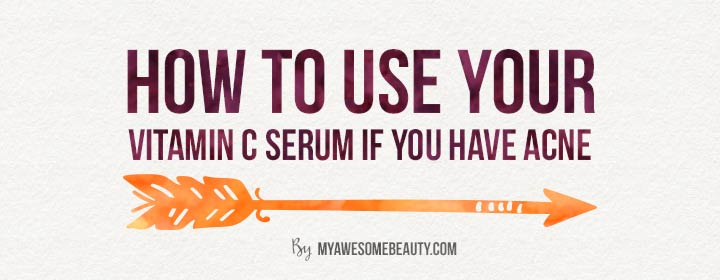
If you want to get the most out of your vitamin C serum, you got to make sure to exfoliate your skin first so to allow better penetration of the serum for the following days. I usually exfoliate at least once a week, to remove the dead skin cells.
- Use your regular face scrub (don’t be too harsh as you don’t want to irritate your skin) (the next 6 days simply wash your face with your usual cleanser or an acne specific cleanser)
- (Optional) use witch hazel (perfect to tone and tighten the pores, check our post here about the 18 uses of whitch hazel on face. Make sure to pick the one without alcohol as it is too drying in the long run)
- Apply the vitamin C serum on your face and let it penetrate for 5 minutes.
- Apply your day cream with SPF /night cream (important to wait at least 5 minutes as the serum PH is lower to be effective. If you apply your cream too quickly, you will modify the overall PH and “neutralize” the vitamin C effect. Let it penetrate for 5 minutes then you can apply the face cream (day or night)
What about oral vitamin C for acne?
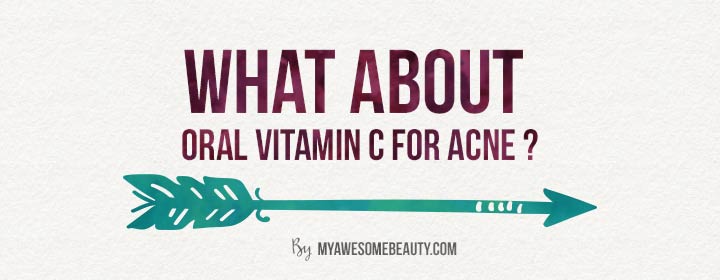
When it comes to acne and vitamin C, my experience shows that topical vitamin C with the use of vitamin C serums is more effective that taking vitamin C orally.
We understand that for a lot of people, oral administration is a lot more convenient and that there are a few additional benefits, but when you’re looking to improve the health of your skin and make it look a lot better (if you have experienced bad acne then this will be the case), then using a serum is a must.
When it comes to choosing a serum over a supplement, there’s no doubting that the serum is more effective in boosting collagen production, battling against free radicals, and making your skin healthier.
But, don’t completely disregard the supplement just yet. If you’re willing to go all in and you want to achieve the best results possible, use both ! Yeah, you can do that. The thing is if you’re going to be taking supplements then as was the was with the serum, search for supplements which also have ingredients for detoxification and clearing the skin such as the one we reviewed here ( the derma cleanse capsules).
Note that this is not compulsory, if you can drink more green juices, smoothies. That can work too.
Another Awesome Product That Can Be Used for Acne
We have discussed a lot in this article – all of which you can use to support your battle against acne and getting rid of it for good.
Skin exfoliation, skin repair, boosting your collagen production. With all of this help, you’ll have a much easier time eradicating your acne and repairing the damage that it’s time. That being said, there’s one last thing that we want to quickly discuss: controlling skin oil production
To do so, my all time favorite skin care product is using bentonite clay mask every week (or twice a week if your skin is really oily)
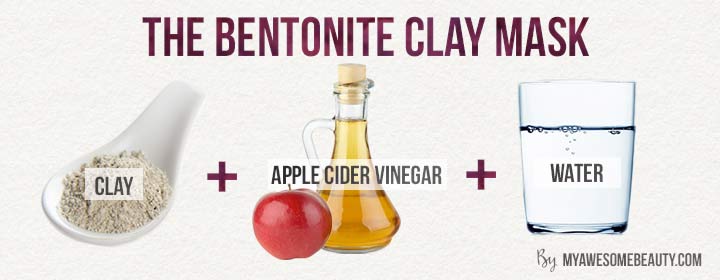
Bentonite Clay Masks really help to absorb excess skin sebum and reduce inflammation. They also deep cleanse by removing toxins, impurities and unblock pores if need be.
Ingredients:
- A plastic bowel / make sure not to use any metal containers or utensils to stir or store the clay powder as any contact with metal can affect the clay’s action and potency.
- A brush or spatula for applying the mixture to face
- Organic apple cider Vinegar (we use this brand here on Amazon)
- bentonite clay ( the brand we recommend on Amazon )
Directions:
- Mix together 1-part apple cider vinegar, 1-part water, and 2-parts bentonite clay. Continue to mix this together until you have a smooth paste and if necessary, add small amounts of each ingredient if you need to.Once the paste is prepared, carefully apply it to your face (or the affected area) making sure to avoid your eyes, nose, and mouth.
- After applying the paste wait for it to dry. If you have sensitive skin then wait between 5 and 10 minutes but if you don’t, wait between 15 and 20 minutes. Whilst the mask dries, you’ll feel a slight tightening feeling – don’t worry, this is normal.
- Once it’s completely dried, wash the bentonite clay off of your face using warm water. At first, your skin might be a little red, that is a normal effect too as you stimulated the skin circulation too. it will be back to normal within 20 -30 minutes.
- you can apply your vitamin C serum right afterwards as this mask it is a bit like cleansing your skin.
We hope that this guide helped you understand that vitamin C alone alone is not enough for acne, if you want to benefit from the properties of vit C we recommend you to use a vitamin C serum that has some of the actives we mentioned above.
Further reading :
Leave a Reply